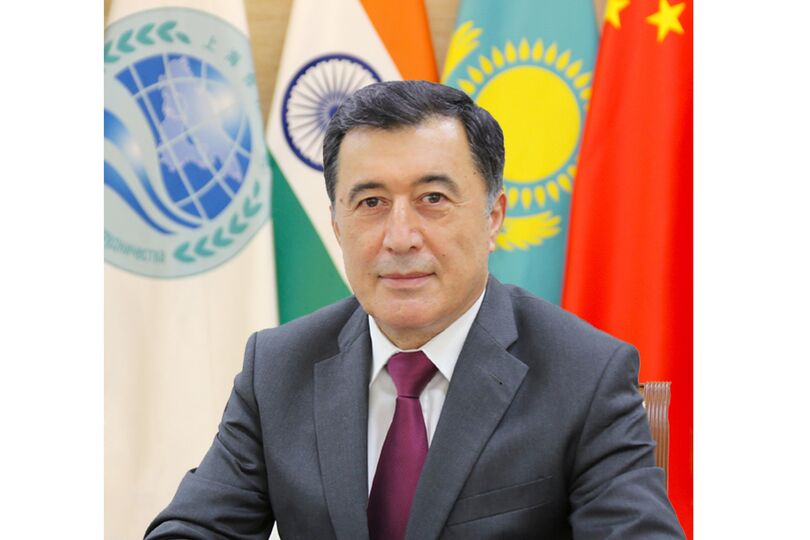The rationale for establishing the Shanghai Cooperation Organisation was based on radical changes in the system of international relations in the late 20th century. After the end of the Cold War the world did not become any safer. Moreover, new threats and challenges emerged that acquired a global and unpredictable nature. It became evident that one or several countries cannot ensure security in the 21st century.
It was in that troubled period when leaders of the SCO founding member countries displayed wisdom and vision by choosing a strategically correct path towards enhancing multilateral cooperation, and established the Shanghai Cooperation Organisation.
As early as then, the SCO stated that the 21st century world order should rest on the mechanisms of collective solutions to key problems, the primacy of law and consistent democratisation of international relations. Moreover, three months prior to the tragic 9/11 events in New York in 2001, the Convention on Combating Terrorism, Separatism and Extremism was signed within the SCO, a document which served as evidence of the organisation's readiness to aggressively fight these "three maligned forces."
It is hard to imagine what the vast Eurasia region would go through unless the SCO was building up an atmosphere of trust, stability and predictability throughout all those years. Despite growing security threats and challenges, the SCO region, which covers up to 60 per cent of Eurasia, has been enjoying firm stability thanks to efficient interaction within the organisation. This is an undeniable fact.
Speaking about China's role at the SCO, I would like to highlight specially that China was among the initiators and founders of the SCO. The organisation carries the name of Shanghai, a beautiful Chinese city and cradle of the SCO, where in 1996 the mechanism for the convening of annual meetings of the leaders of China, Russia, Kazakhstan, Kyrgyzstan and Tajikistan was launched, an event that went down in history as the Shanghai Five. The mechanism laid the groundwork for a new format of multilateral dialogue, which achieved a key result and arrived at a general vision of joint development and that peace and stability would be ensured in the regions. In 2001, the Republic of Uzbekistan voiced its intention to develop cooperation with the Shanghai Five, and on 15 June 2001, the birth of the Shanghai Cooperation Organisation was announced in Shanghai. The SCO Secretariat is based in China's capital, Beijing.
The key principles of SCO cooperation stem from the so-called "Shanghai spirit" which embodies mutual trust, mutual benefit, equality, consultations, respect for the diversity of cultures and commitment to joint development. The term "Shanghai spirit" is currently known around the world and has enriched the theory
of international relations. The consensus model of decision-taking within the SCO, which is based on equal dialogue, reciprocal respect and taking into account the interests of others reaffirms its special importance and applicability with every coming year as part of the ongoing irreversible processes of the emergence of a multipolar world order.
Cooperation in the SCO is built up on the basis of the inclusion of all countries regardless of their political weight, economic potential, territory or population size. Meanwhile, each member-state makes its own contribution to the SCO development, and in this respect China plays a creative and constructive role at that.
Throughout the SCO's existence, China has invariably put forward crucial initiatives in security, politics, the economy and the humanitarian dimension. China's top leaders regularly propose detailed suggestions. Thus, following the PRC's chairmanship, Xi Jinping at the historic SCO Summit in Qingdao articulated impressive steps to enhance the SCO's development. They include China's readiness to train 2,000 law enforcement personnel for the SCO countries in the coming three years, to launch a targeted 30 billion Yuan credit programme as part of the SCO Interbank Association, to offer member states 3,000 grants towards human resource development in the coming three years. All that is evidence of China's commitment to raise total potential of the SCO and to assist in the socioeconomic development of SCO member states.
In addition, China president Xi Jinping's Belt and Road Initiative has garnered the approval and support of the majority of the SCO member states as the initiative is based on centuries-old traditions of friendship, mutual respect, mutually advantageous cooperation and is aimed at developing those countries and peoples who share these traditions and values. The Belt and Road unveiled real prospects for interaction in transport as well, which is a key area of SCO activities. It is common knowledge that an efficient transport system has a direct impact on making progress in trade and economic cooperation and also serves to establish an unbreakable connection between peoples. In this aspect, the Belt and Road objectives, that are aimed at the formation of new bilateral and multilateral mechanisms for transport and logistics, are very timely and important for SCO countries, the Central Asia nations in particular.
Generally, considering all initiatives and long-term projects proposed within the SCO by the Chinese side, let us say that China provides high-level exposure of our organisation in its foreign policy, which has faced multiple challenges and achieved considerable success in its 70 years.
Currently Chinese diplomacy is on the front lines defending peace in the world, standing up to the right of peoples and nations to secure and sustain their development on the basis of international law. Apparently, as China grows peacefully and its economic power increases, its role in settling regional and global issues also grows. Its economic potential is gradually transforming into political power as China's global profile expands. At present, the opinion of the People's
Republic of China is taken into account for any problem in the region or in the world.
